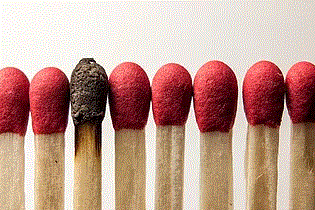Dodging Burnout: 12 Tips for Dealing with Stress and Strain


Like most chaplains, I have another job when I’m not with the fire service. I work for a hospital. In both cases, I work as a chaplain. And just a few minutes ago, I got a letter from a hospital co-worker saying she’s resigning. This last year was too much. She doesn’t want to be involved in chaplaincy anymore. So, she is moving on to something else after many years as a chaplain. She has taken time off and a leave of absence this year, but it wasn’t enough. In this case, both compassion fatigue and burnout are at play.
The fact is that a lot of chaplaincy is about grief work. And when we are called to join in with this person and that person’s grief, loss, and frustration, it takes a toll on our mind, body, and spiritual life. Just like our firefighters and police officers, chaplains face the reality of vicarious trauma and compassion fatigue on top of their grief and loss. And just like our volunteer public safety officers, many volunteer chaplains do this on top of other jobs, often similar ones, which can compound the stress.
Seven Answers from Scripture
As a Christian and a chaplain, I look to the Bible for answers. Here’s what I find. Take these as suggestions if you are starting to feel the strain on your life.
Get sleep. Sleep is a blessing and necessary for you to survive. (See 1 Kings 19)
Get away from it all. Take time for retreat and to refocus on the essential things. (See Matthew 14)
Follow sabbath. God set aside this time for us for a reason. (See Mark 2:23-28)
Prioritize prayer and worship. God wants us to take time to pray and commune with him, especially when we are stressed. (See Matthew 26: 36-46)
Have a good theology of death. This one is very important. We, as chaplains, see a lot of death, and if we don’t put it into perspective, then we will always walk away asking the question, why did this happen? (See Romans 6:23)
Refocus on the now. It’s too easy to worry about what will happen down the road and forget that life is lived in the present. (See Matthew 6:25-34)
Be accountable and lean on fellow believers for help. God put us in a community to help each other. Let’s use it. (See Ecclesiastes 4:9-12)
Five Practical Strategies
Get a physical. Do this every year. Grief work can really mess up the chemical balance in your body. Sometimes, we must get things worked out physically before we can tackle the spiritual.
Get exercise and eat healthy food. Do what is appropriate for your body. If you don’t know, talk with your doctor.
Take vacations. This is hard, even for me. When I don’t work, I don’t get paid. But taking time away from work helps cleanse your mind and body. Have fun. Have an adventure. (And if you want, invite me!)
Talk with a trusted professional counselor. Sometimes, you need that little bit of extra help. That’s okay. But try to find one with faith; otherwise, you will be frustrated… or, worse yet, led astray.
Take a break. And frankly, it’s okay to step back from this ministry if God allows. Not everyone is called to be a firefighter or police officer, and not everyone is called to be a chaplain. And you don’t have to do it for the rest of your life.
Conclusion
The fact is that we, as chaplains, don’t see a lot of good days. My pager doesn’t go off for good things. People call for us when things have gone horribly wrong. As Chaplain of the House of Representatives Fr. Patrick J. Conroy, S.J. says, “You don’t need a chaplain, till you need a chaplain.” Like our first responders, crisis response chaplains are there when things go bad. And the more we absorb this without letting it go, the more it will affect our minds and bodies and, ultimately, our spiritual life and walk with God.
